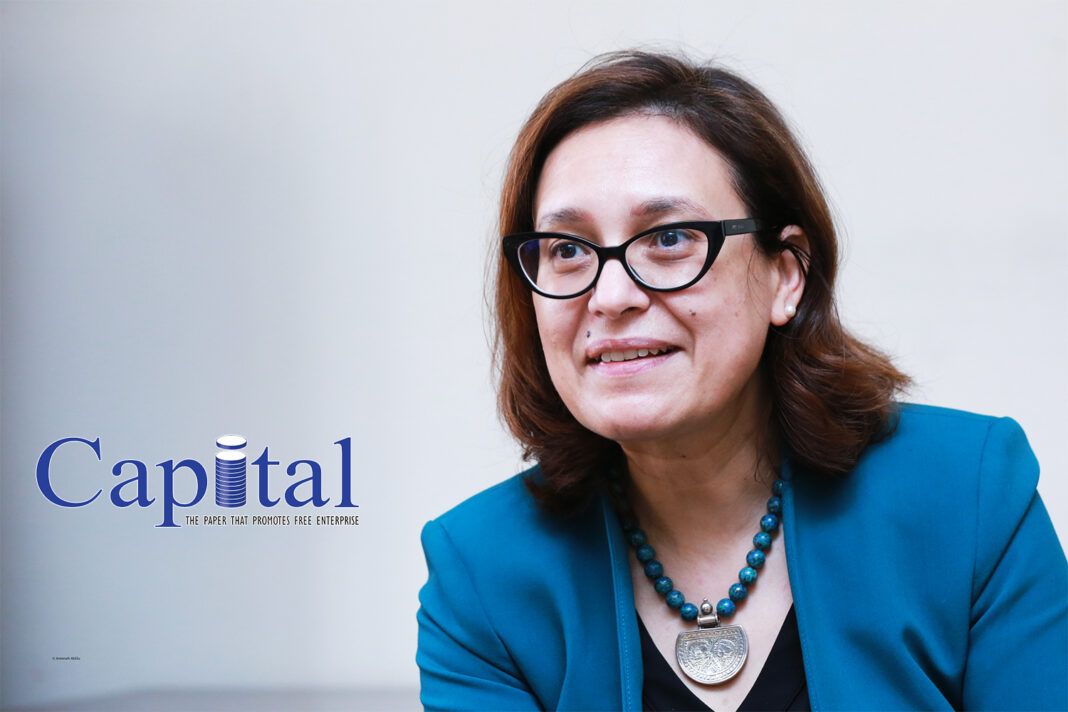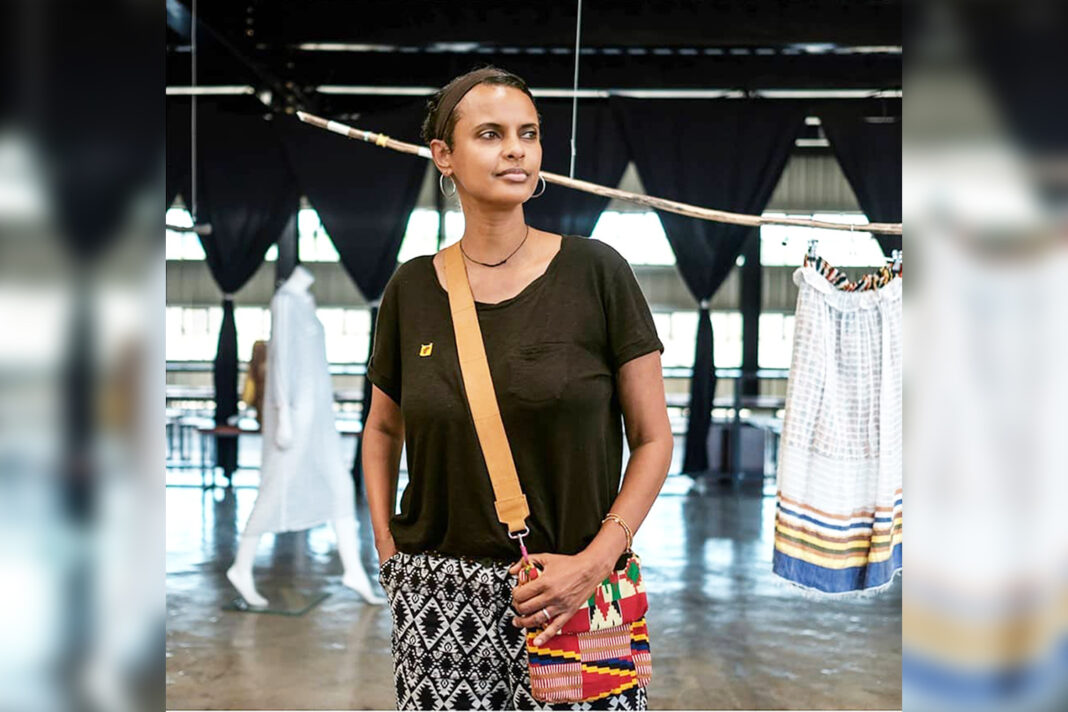Nezha Alaoui M’Hammdi is Senior Fellow at Policy Center for the New South (since 2020) and the current Ambassador of the Kingdom of Morocco to Ethiopia and Djibouti since 2016. She has served as first Permanent Representative of the Kingdom of Morocco after its return to the African Union by 2017, and to the Peace and Security Council of the AU (April 2018). She is currently Dean of the Council of Arab League Ambassadors to Ethiopia.
She also served from 2013 to 2016 as an Ambassador of Morocco to Ghana, Togo and Benin, being the first Moroccan female Ambassador of the Kingdom of Morocco in Africa.
After joining the Moroccan Ministry of Foreign Affairs of Morocco in 1989, Nezha Alaoui M’Hammdi served mainly in Italy and Ghana. She talked to Capital about the bilateral relation and investments of the two countries. Excerpts:
Capital: Ethiopia is considered as a strategic partner for Morocco, regarding its crucial regional position and its role in sustaining peace and stability in the region and the Horn of Africa. How do you describe that?
Nezha Alaoui: Allow me first to start with the historical ties that have gathered the two countries through centuries. Ethiopia, this hospitable, centuries-old nation, has a special place in the collective memory of Moroccans, as well as of Muslims as a whole. In the Moroccan memory, Ethiopia will always be associated with our roots, history and identity, as a group of travelers walked through this blessed land, on their journey from Yemen and the Levant, to settle in what later to become Morocco. Similarly, Muslims will always remember the Kingdom of Axum, which granted refuge and protection to a group of companions of the Prophet Muhammad, peace be upon him. 
Added to that, Ethiopia is hosting the African Union headquarters and enjoys a strategic location not only in the Horn region but also in Africa. Ethiopia is also commended for its role as a stabilizing country in the Horn of Africa. Furthermore, Ethiopia, home to more than a hundred and ten million people, has become a major power in the Horn of Africa. It has seen some of the world’s highest GDP growth in recent years, and has made strides in health and education. For all those raisons, Ethiopia will remain a strategic partner to Morocco.
Capital: What is the current trade balance between the two countries?
Nezha Alaoui: In fact, despite the modest trade balance recorded by trade exchanges between Morocco and Ethiopia, the trade relations between the two countries show a very promising future, given the huge potential provided by the two countries' markets, as well as their promising economies. In this respect, the trade between Ethiopia and the Kingdom of Morocco is significantly increasing in last few years. It seems that the opening of a direct flight between Casablanca and Addis Ababa, which we aspire to launch, will constitute a very positive turn in enhancing not only trade exchanges but also the advancement of bilateral relations to the level desired by the two countries. It is to be underlined that Ethiopia absorbs 50% of the Moroccan fertilizers exports to Africa. On the other hand, Most of Ethiopian exports to Morocco is agricultural commodities. For instance, Beans, Coffee and Ginger contributed 90 % of export in the last ten years.
We are also currently preparing a virtual trade exchange meeting between the Moroccan and Ethiopian Trade Department in order to look forward enhancing trade ties between the two countries.
Capital: How are Morocco’s investments in Ethiopia doing?
Nezha Alaoui: The Embassy is aiming to contribute in enhancing bilateral economic cooperation and attract more Moroccan investors to Ethiopia. In terms of investment, the interest of Moroccan investors in the Ethiopian market is increasing. This includes investments by Anwar Invest Group and Holmarcom Group, the country’s top investors. Many other companies are in the study phase, such as Saham holding Group, a panafrican investor of reference. Business relations between the two countries witnessed also the organization of two business forums (Addis Ababa, November 2016 and Rabat, April 2017). Morocco also participated in October 2017, as guest of honor at the "Addis Ababa International Fair” with the organization of B to B. Ethiopia was selected as a guest of honor in the Africa Development Forum, which was organized in Casablanca, Morocco, on 15 and 16 March 2019. Considered as one the most important investment platform in Africa, this Forum has witnessed the participation a very important delegation, led by His Excellency Dr. Aklilu Hailemichael, Former State Minister for Business Diplomacy and Diaspora. Ethiopia has also participated, for the first time and with an important delegation, including public actors and private sector, in the 14 th Edition of the International Agriculture Fair, held in Morocco, from 16 to 21 April 2019. Especially in the economic field, the reforms in Ethiopia are encouraging our private sector to settle their business in Ethiopia, which is nowadays attracting more attention of the Moroccan companies. Ethiopia also provides a very attractive market and its Government’s policy of reforms is creating conditions to favor economic development, including through more foreign investment.
Capital: Morocco returned to the AU recently; what are the gains and expectations from it?
Nezha Alaoui: The return of the Kingdom to the African Union, its institutional family, testifies to Morocco’s unwavering will to initiate a dynamic of global and sustainable development throughout the Continent.
The Kingdom, a founding father of the OAU, has continuously joined efforts with African brethren to hoist Africa to the level of active forces on regional and international levels. Morocco’s action within the African Union draws its substance from this same perspective, as underlined by His Majesty King Mohammed the VI at the AU 29th Summit, held January 31, 2017 in Addis-Ababa: “This is the path to solidarity, peace and union chosen by my country. We reaffirm our commitment to the development and prosperity of African citizens. We, peoples of Africa, have the means and the genius; together, we can fulfill the aspirations of our peoples” said His Majesty King Mohammed the VI. In this regard, AU must provide this space that unites ambitions and pools strategies because its role is crucial to expressing a continental vision which breaks with past approaches. Finally, AU must be the locomotive of an Africa that moves forward, an Africa that trusts itself and an Africa that evolves.
Capital: How successful is the South-South cooperation going?
Nezha Alaoui: On a Continental scale, Morocco attaches priority importance to development, peace, stability and security in Africa. Its action has been and always will be guided by a strong faith in Africa, a Continent which is proud of its cultural and spiritual heritage, and which confidently looks to the future.
Through an authentic and tangible South-South cooperation model, Morocco consolidated its cooperation in the traditional areas of training and technical assistance, but also engaged in strategic sectors such as food security and infrastructure development.
As an emerging African power, Morocco has given more attention to its partnership with Africa, especially through initiatives in South-South Cooperation. In this respect, Morocco, being an African reference in the Agricultural sector, shares with many African countries knowledge, know-how, experiences and lessons learned, further contributing to achieving food security in Africa, by supporting sustainable agricultural production in order to benefit local farmers.
With the Ethiopian Government, Morocco is proud to establish a strong partnership in the field of Agriculture, through the OCP Company, mainly in the fertilizers supply and expertise sharing.
His Majesty’s 2016 Visit to Ethiopia was a historic moment in the bilateral relations between the two countries. It allowed the signature of 12 Agreements, which include the MoU to set a factory for fertilizers production, named Dire Dawa Fertilizer Complex. Aiming to be a model in the South-South Cooperation, the plant is set to support Ethiopia reaching self- sufficiency in fertilizer production, with prospects of investing in its potential for exportation too.
Capital: Ethiopia’s former Ambassador to the Kingdom of Morocco, Yeshi Tamrat, has been bestowed by His Majesty King Mohammed VI, King of Morocco, with the Alawite Wissam of the Order of Grand Officer at the end of her mission in the Kingdom of Morocco; tell us about that?
Nezha Alaoui: I felt extremely honored to award this Decoration to H.E. Ambassador Yeshi on behalf of His Majesty. This decoration, which was created over a century, is one of the most prestigious Royal Decoration in the Kingdom awarded to foreign dignitaries. It is a high-level decoration graciously bestowed by His Majesty upon her Excellency Ambassador Yeshi in appreciation of her noble endeavors to upgrade the brotherly bilateral relations between Morocco and Ethiopia. It is also a recognition of her distinguished and significant contribution to strengthening bilateral relations between our two countries.
It also reflects the high quality of relationships that so happily exist between our two brotherly peoples and countries. In fact, Ambassador Yeshi, who was assigned in 2016 in Rabat to reopen the Ethiopian Embassy, has played, since, a pivotal role in this contemporary era. She is indeed a distinguished and highly qualified diplomat who performed her duties with devotion, professionalism and commitment. During her term, we witnessed two successful Royal Visits to Ethiopia, to which her contribution was instrumental, and during which fundamental agreements were signed and to consolidate the foundations of a rich and promising future for our relations.
She has also greatly contributed to promoting bilateral ties through coordinating officials visits to both countries. She played, in this regard, an important role in promoting economic, trade and business links between the two countries. Since her assignment, both countries has also successfully organized, among others, three editions of the Moroccan Ethiopian Business Forum.
Capital: What are the cultural ties that Morocco and Ethiopia share?
Nezha Alaoui: Taking the geographical distance between Morocco and Ethiopia into consideration, anyone can assume lack of common values in both countries. However, there are core values and cultural similarities in common.
Morocco and Ethiopia are both lands of tolerance and coexistence between peoples and religions. Since my appointment as an Ambassador of His Majesty to Ethiopia, I have realized, in the daily life situation, that we have core values in common that are related to our identities, civilizations, history, tolerance between religions, coexistence, firm and strong determination to move forward, and success stories in development.
The other point I noticed also that we have in common is our cultures and traditions much similar with the Ethiopians. For instance, in Morocco we have a kind of music and dance very similar to the Ethiopian ones. We use the instrument that is very famous here which is Masinko, we also use it in Morocco.
We are encouraging the participation of the two countries in the events held in Ethiopia and Morocco in order to reinforce the cultural bilateral ties. In this regard, we witnessed the participation of Fendika Group in Timitar international Festival, held in Morocco in June 2019. Later in November 2019, the same Ethiopian music group with other Ethiopian delegates, has participated in the “Visa For Music” festival in Morocco and its Fendika Group Director was awarded on this occasion.
We are very pleased also that one famous traditional Moroccan group visited Ethiopia, on the occasion of the reception organized to celebrate the National Day of Morocco in July 2019. I am sure that the next will be full of cultural exchange activities between the two countries due to the existing potential in this respect.






